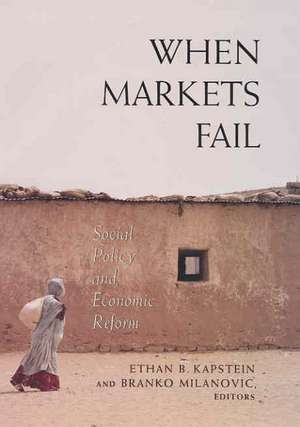When Markets Fail: Social Policy and Economic Reform
Editat de Ethan B. Kapstein, Branko Milanovicen Limba Engleză Hardback – 13 noi 2002
The sweeping political and economic changes of the past decade—including the spread of democracy, pro-market policies, and economic globalization—have dramatically increased the demand in developing countries for social programs such as unemployment compensation, pensions, and income supplements for the poor. When Markets Fail examines how emerging market economies in Eastern Europe, Latin America, North Africa, and the Middle East are shaping their social policies in response to these changes. The contributors—leading scholars of development and social policy—use detailed case studies to examine whether the emerging economies are likely to move toward European-style welfare systems, characterized by high unemployment benefits and large entitlements, or if they will opt for more austere, stripped-down welfare regimes. They find that much will depend on how well emerging economies perform economically, but that the political forces, ideological preferences, and historical backgrounds of each country will also play a decisive role. In his chapter on Central and Eastern Europe, Peter Lindert focuses on how aging populations and the fall of communism have fostered increased need for social assistance in the region. In contrast, Nancy Birdsall and Stephen Haggard highlight the positive role of democratization and Western-style social programs in promoting East Asian social policies. Zafiris Tzannatos and Iqbal Kaur argue that governments in North Africa and the Middle East must foster both human capital formation and competition in the market for social services if they are to meet the growing need for services. When Markets Fail presents some evidence that a global convergence in social policies may be taking place: as Europe slowly makes its welfare provisions less generous, the emerging market economies will be under increasing demographic and political pressure to make their social welfare systems more comprehensive. The book also examines the vital role that organizations such as the World Bank, the International Monetary Fund, and the Asian Development Bank can play in fostering effective social services in developing economies. Economic globalization and political liberalization have produced many economic winners around the world, but these forces have created losers as well. When Markets Fail addresses the problem of how governments in developing countries have responded to the plight of those losers through social policy. The success of these policies, however, remains sharply contested, as is their role in helping to achieve meaningful poverty reduction. When Markets Fail is essential reading for anyone interested in economic liberalization and its consequences for the developing world.
Preț: 325.10 lei
Nou
Puncte Express: 488
Preț estimativ în valută:
62.20€ • 64.95$ • 51.37£
62.20€ • 64.95$ • 51.37£
Carte indisponibilă temporar
Doresc să fiu notificat când acest titlu va fi disponibil:
Se trimite...
Preluare comenzi: 021 569.72.76
Specificații
ISBN-13: 9780871544605
ISBN-10: 0871544601
Pagini: 245
Dimensiuni: 152 x 229 x 25 mm
Greutate: 0.5 kg
Ediția:New.
Editura: Russell Sage Foundation
Colecția Russell Sage Foundation
ISBN-10: 0871544601
Pagini: 245
Dimensiuni: 152 x 229 x 25 mm
Greutate: 0.5 kg
Ediția:New.
Editura: Russell Sage Foundation
Colecția Russell Sage Foundation
Notă biografică
ETHAN B. KAPSTEIN is with the University of Minnesota, and INSEAD, France. BRANKO MILANOVIC is with the World Bank, Washington, D.C.
